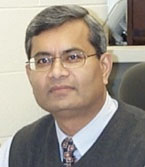
DETROIT – A groundbreaking discovery at the Wayne State University School of Medicine into the fundamental mechanism of insulin secretion – critical to the management and treatment of diabetes – could lead to better drug targets for the more than 350 million people worldwide who live with the metabolic disorder.
Distinguished Professor of Physiology Bhanu Jena, Ph.D., led a team that showed, for the first time, that isolated insulin-secreting porosomes are functionally reconstituted into live-insulin-secreting beta cells.
Secretion is a fundamental cellular process that occurs in all living organisms. Cell secretion is responsible for numerous activities, including neurotransmission and the release of hormones and digestive enzymes.
The article “Functional reconstitution of the insulin-secreting porosome complex in live cells,” published in the journal Endocrinology, illustrates the clinical importance of the porosome complex. Jena discovered porosomes – cup-shaped supramolecular structures in cells – nearly 20 years ago using atomic-force microscopy. Porosomes, now textbook subject matter, are the universal secretory machinery at the cell plasma membrane.
An editorial supporting the clinical significance of his work was published Dec. 4 in the Discoveries journal, a publication of Harvard University.
“The discovery of the porosome complex has come full circle: from elucidation of its structure and dynamics in secretory cells examined, to its structural and functional reconstitution into artificial lipid membranes and secretory cells, and the identification of its important participation in health and disease, resulting in a paradigm-shift in our understanding of the secretory process,” said Iowa State University’s Lloyd Anderson, Ph.D., who wrote the editorial.
“We are delighted that after nearly 12 years of background work, we were finally able to functionally reconstitute the porosome complex in live cells. This is a milestone for us,” Jena said. “We hope to similarly accomplish reconstituting the neuronal porosome complex in neurons and the cystic fibrosis transmembrane conductance-associated porosome complex in the human airways epithelia. These studies, in addition to contributing to our understanding of the molecular mechanism of cell secretion, have promise for drug development therapy. Much work, however, remains to be done.”
Studies from the Jena laboratory demonstrate the involvement of porosome-associated proteins in neurotransmission and neurological disorders, including post-traumatic stress disorder, he added.
“PTSD attributed to traumatic life experiences, explosions or continuous loud white noise pollution has been demonstrated to result in memory loss anxiety and severe sleep disorders, among other health detriments,” he said. “PTSD is shattering the lives of thousands of soldiers returning from active duty, and millions of our civilian population, exposed to PTSD-inducing high amplitude white noise.”
He will lecture on the role of porosomes in PTSD at the Science and Society Conference Feb. 26 at California Institute of Technology in Pasadena, Calif., and will deliver a weeklong series of Distinguished Lectures on the subject at Jawaharlal Nehru University, New Delhi, in June. Both appearances are by invitation, with the India appearance financially supported by the India government’s Global Initiative of Academic Networks.
“This is huge progress in the field of beta cell biology, insulin secretion and diabetes, given that specific proteins composing the insulin-secreting porosome complex are potential drug targets,” Jena said.
Work in the Endocrinology journal article was supported in part by grants from the National Science Foundation, the WSU Interdisciplinary Biomedical Systems Fellowship and the Thomas C. Rumble University Graduate Fellowship.
About Wayne State University School of Medicine
Founded in 1868, the Wayne State University School of Medicine educates more than 1,000 medical students in Midtown Detroit. In addition to undergraduate medical education, the school offers master’s degree, Ph.D. and M.D.-Ph.D. programs in 14 areas of basic science to about 400 students annually.
Wayne State University is a premier urban research institution offering more than 380 academic programs through 13 schools and colleges to more than 27,000 students.
